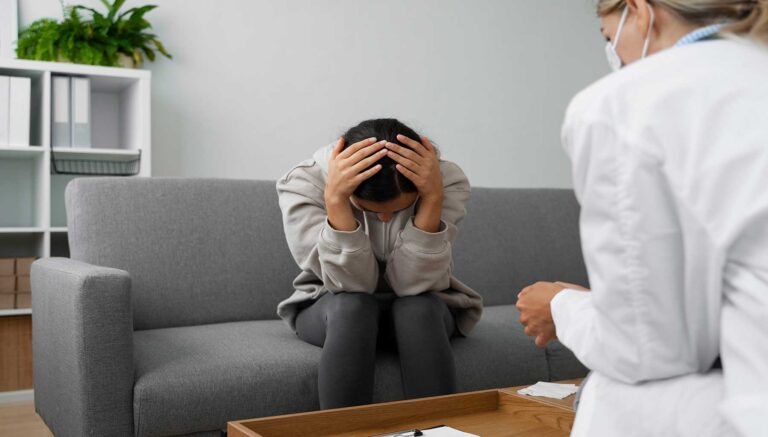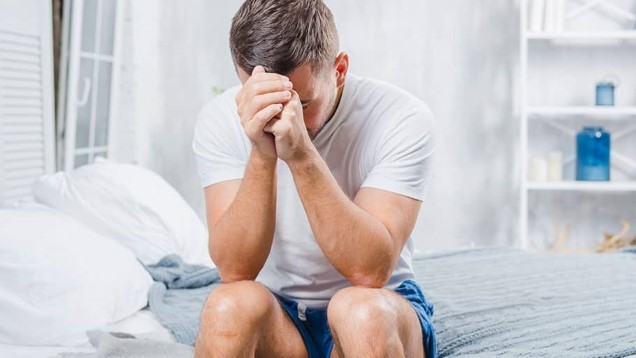
Depression: Understanding Symptoms, Causes and 5 Treatments.
Visit these apps to continuous your journey.
Millions of people worldwide suffer from the complicated youth mental health illness known as depression. In order to create a supportive atmosphere and provide practical answers, it is important to comprehend its symptoms, causes, and available treatments.
A. Unveiling the Depths of Despair
Depression isn’t merely a fleeting sense of sadness; it’s an enduring fog, a weighty cloud of hopelessness and despair that envelopes individuals. It transcends emotion, demanding an intricate understanding of its emotional nuances.
b. Imperative of Comprehending Depression
Understanding depression is not a luxury in a society where mental health is a complex issue; rather, it is a basic need. It’s about building open dialogue about the precarious state of mental health, expanding empathy, and tearing down social stigmas.
II. Symptoms of Depression in youth
Conditions like hypogonadism or problems with the adrenal glands can disrupt the balance of hormones, making the situation of hormonal imbalance more complicated.
A. Discerning Covert Indicators
- Subtle Behavioral Shifts: Depression is a master of disguise, often hidden in inconspicuous changes like withdrawing from cherished activities or tweaking daily routines.
- Scholastic Dips: Particularly in adolescents, a decline in academic performance can be an early sign of underlying emotional turmoil.
B. Adolescence Unveiled
- Social Withdrawal in Teens: Unraveling the complex signs of teenage depression, often expressed through nuanced social withdrawal, is imperative for early intervention.
- Tailored Solutions: Crafting solutions attuned to the unique challenges teenagers face is essential for their well-being.
C. Probing Adolescent Psychology
- Unique Teen Stressors: Adolescents grapple with distinctive stressors. Unpacking these challenges allows us to offer targeted and effective support.
- Developmental Impacts: Delving into how depression shapes the developmental journey of adolescence provides insights into coping strategies.
III. Causes of Depression in youth
Peeling back the layers reveals lifestyle choices and hidden medical conditions shaping the narrative of hormonal disharmony.
A. The Role of Genetics in the Mix of Causes
- Genetic Predisposition: Genetics casts its shadow, predisposing some individuals to depression. Shedding light on this aspect is akin to unveiling a potential risk factor.
- Family Legacy and Markers: Understanding family history and genetic markers becomes a compass, guiding the identification of those at higher risk and enabling proactive measures.
B. Echoes of Youth in the Great Depression
- Historical Trauma: The resonance of historical events, like the Great Depression, echoes in the mental health of the youth. It’s a profound exploration into understanding how the past reverberates in the present.
- Intergenerational Ripples: The impact isn’t confined to a particular era; it transcends generations. Recognizing these effects helps us fathom the intricate complexities of mental health legacies.
C. Unraveling Adolescent Despondency
- Adolescent-Specific Causes: Adolescent depression isn’t a mirror image of its adult counterpart. It’s shaped by unique factors like academic pressures and societal expectations.
- Tailored Interventions: Acknowledging these unique causes allows for interventions that resonate with the specific needs of teenagers grappling with depression.
D. Historical Narratives of Young Lives
- Resilience and Coping: Examining how the Great Depression shaped the resilience and coping mechanisms of young individuals offers a historical lens on overcoming adversity.
- Modern Parallels: Drawing parallels between historical events and current youth challenges helps bridge the gap between past and present.
IV. Youth Mental Health Treatment Options
To fight depression, try regular exercise, a balanced diet, good sleep, and reaching out for support. Mindfulness and setting small goals can help too. Finding what helps you is key, as everyone’s path to feeling better is unique.
A. Choices Between Talk and Medication
- Individual Proclivities: Recognizing that the efficacy of psychotherapy and medication varies based on individual preferences and needs is pivotal for informed decision-making.
- Holistic Fusion: Understanding the advantages of combining psychotherapy and medication paints a holistic picture of treatment options.
B. Wholistic Approaches to Symptom Alleviation
- Lifestyle Harmony: Incorporating regular exercise, balanced diets, and mindfulness practices acknowledges the intricate dance between mental and physical well-being.
- Alternative Routes: Exploring alternative therapies like yoga and acupuncture alongside traditional treatments recognizes the diverse pathways to mental health.
C. Navigating Lifestyle Adjustments in Depression
- Impact of Lifestyle on Mental Health: Recognizing how lifestyle shifts in sleep, exercise, and stress management impact and alleviate depression symptoms is akin to unlocking the potential of self-care.
- Personal Adaptation: Empowering individuals to make positive adjustments in their lifestyles for enhanced mental well-being is a voyage of self-discovery and self-empowerment.
D. Unveiling Causes of Teen Sadness and Treatment
- Teen-Centric Interventions: Delving into the causes specific to teenage sadness and exploring effective treatment options acknowledges the unique challenges faced by this age group.
V. Conclusion
A. Wrapping Up the Journey
Getting to know depression involves finding hidden signs, learning about its causes, and exploring treatments. It’s about being kind and making sure everyone feels seen and supported.
B. Emphasizing the Human Imperative
In conclusion, addressing depression isn’t a sterile exercise in numbers; it’s about human lives. It’s about weaving a societal fabric where support and understanding flourish, creating a safety net for those navigating the intricate maze of mental health.
Harmonizing Naturally: A Lifestyle Symphony
Amidst the chaos, there’s a natural symphony playing. Lifestyle adjustments, like dietary shifts and stress management, take center stage, offering a melodious path to restore equilibrium.
Dietary Changes: The Nutritional Ballet
- Incorporating Essential Nutrients: Found in a variety of whole foods for hormonal support.
- Balancing Macronutrients: Ensuring a well-rounded intake of proteins, fats, and carbohydrates.
Stress Management: The Serenade of Calmness
- Mindfulness and Relaxation Techniques: To alleviate stress and support hormonal balance.
- Adequate Sleep: A simple yet powerful contributor to hormonal health.
Theatrics of Intervention: Medical Approaches Unveiled
In the grand theater of hormonal health, medical interventions step into the limelight. Medications and Hormone Replacement Therapy (HRT) take center stage, offering tailored performances for individual needs.
Medications: The Pharmacological Sonata
- Overview of Medications Prescribed for Hormonal Imbalances.
- Importance of Adherence to Prescribed Treatments: For Effective Results.
The Personal Touch of HRT: A Bespoke Performance
Contrary to a robotic approach, HRT takes into account the unique hormonal landscape of each individual. This personalized touch ensures that the therapy aligns with the specific imbalances identified, fostering a more natural and effective restoration process.
Fortifying Against Imbalance: A Preventive Overture
Prevention becomes the overture, setting the stage for a holistic approach to hormonal health. Lifestyle adjustments, rhythmic exercises, and periodic health check-ups create a fortress against hormonal disharmony.
Professional Guidance:
- Importance of consulting healthcare professionals for accurate diagnosis.
- Overview of hormone testing methods, including blood tests, to understand your unique hormonal profile.
Uncovering the Impact of Stress and Bad Eating Habits
Stress emerges as a significant protagonist in hormonal imbalances, weaving shadows over our well-being. Simultaneously, dietary habits loaded with processed temptations cast a spell, disrupting the harmonious dance of hormones.
Lifestyle Adjustments: The Daily Rituals
- Regular Exercise: Incorporating physical activity into daily routines.
- Healthy Diet: Emphasizing whole, nutrient-dense foods for overall well-being.
- Periodic Health Check-Ups: The Vigilant Watch.
FAQs
Teenage depression can be recognized by looking for minor behavioral changes, adjustments in academic performance, and retreat from social interactions.
Susceptibility to depression is influenced by genetic predisposition. Identification of those with a higher risk is aided by knowledge of genetic markers and family history.
You can naturally overcome depression with regular exercise, a healthy diet, mindfulness, and a solid support network.
A consistent sleep routine positively impacts mental health by supporting cognitive function and emotional well-being.
Related
some frequent questions
- What is the best way to lose weight?
- How many calories should I eat to lose weight?
- What are some effective weight loss exercises?
- How long does it take to lose weight?
- What are some healthy weight loss meal plans?
- What foods should I avoid when trying to lose weight?
- What are some effective weight loss supplements?
- Can I lose weight without exercising?
- How much weight can I lose in a month?





